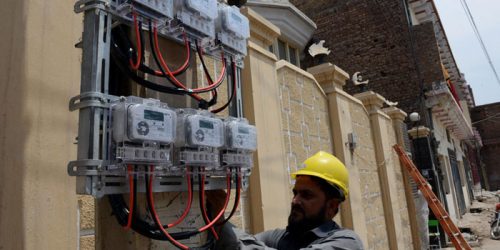ISLAMABAD: The Economic Coordination Committee (ECC) that met here on Wednesday with Dr Hafeez Sheikh in the chair approved flat tariff regime at Rs11.97 per unit for electricity consumers of domestic, commercial and industrial sectors using ToD (Time of Day) meters for four months of winter season to be effective from November 1, 2019 to end February 2020.
It is pertinent to mention that The News in its edition of October 25, 2019 already published the story with headline’ Flat tariff regime: Massive relief for power consumers on the cards’ saying that in a welcoming development, the government is all set to introduce flat tariff regime for electricity consumers having ToD (Time and Day) meters at Rs11.97 per unit for four months of winter reason.
However, Federal Minister for Energy Umar Ayuab Khan may hold a presser today or tomorrow about the government decision on introduction of flat tariff regime highlighting benefits of the initiatives which includes relief in tariff, stimulation of the economic activities and tackling the huge capacity payment issue at reasonable level.
“Yes, ECC has approved the flat tariff regime for winter season that will not only provide massive solace to the electricity consumers, but it will also help the government to cope with the monster of capacity payments that have swelled to Rs849 billion as the idle power projects in winter season will be utilised,” one of the top man of the Power Division told The News.
He said it is a new initiative and its success lies in its true implementation for which the government will have to launch a campaign to convince the consumers of domestic, commercial and industrial sectors for utilisation of the maximum electricity in winter season at flat rate. The campaign will be initiated at the level of electric power distribution companies (Discos), business chambers, traders’ associations so that they could be allured to use the electricity maximum at flat tariff.
To a question, he said that at present 12000-13000MW electricity is being utilised and with this initiative the government will have to generate additional 2000MW, which may increase up to 3000-4000MW meaning by that the total electricity consumption may increase to 16000-17000MW apart from the hydrogenation which at time becomes negligible in the winter season because of de-silting of canals and more importantly the hydro-generation in the winter season also tumbles as it all depends upon the flow of water which gets reduced in the winter season and the demand of water releases from provinces also decreases.
According to the ECC summary, the domestic consumers with ToD meters, at present, pay electricity tariff at Rs21 per unit during peak hours (6pm to 10pm or 7pm to 11pm) and Rs18 per unit during off peak hours (11pm to 6m). And now under flat tariff regime, they will be paying one tariff Rs11.97 per unit. Similarly, the commercial consumers having ToD meters at present pay the tariff of Rs18 per unit during peak hours and Rs16 per unit during off-peak hours. Now they will be paying flat tariff at Rs11.97 per unit all the time.
Similarly, the industrial consumers of B1 and B2, Mr Khan elaborated saying that during peak hours their tariff stands at Rs19 per unit and Rs15 per unit during off-peak hours and now they will pay flat tariff at Rs11.97 per unit.
Joint Secretary (Power) at Power Division Zargham Eshaq Khan also confirmed to The News that ECC has approved the Power Division summary seeking implementation of flat tariff regime in winter season.
He said that the base tariff that Nepra has determined would not be affected and more importantly the revenue will also not be affected in the said four months of the winter season. Zargham Eshaq Khan said that the challenge of the government is to pay huge amount of Rs849 billion during this financial year in the head of capacity payments to power plants (IPPs) and when the power plants become idle on account of massive reduction in demand for electricity in winter season, the capacity payment per unit stands at Rs4.94 per unit and when the power projects become operational and the electricity will be used even in winter season at the maximum that will also increase the commercial and industrial activities apart from the raise in electricity consumption in the domestic sector. And this will result in reduction of the capacity payment charges to Rs3.05 per unit that power consumers pay.
So the government is going, he said, to abandon ‘electricity save policy’ and encourage the use of electricity at the maximum during winter season. “Since we have too much electricity in the system and during the peak of summer season, the electricity consumption increases to over 25000MW but in winter season electricity consumption massively tumbles to 12000-14000MW and at time it further decreases to 9000MW.”
Mr Khan further said that the government is going to end the un-serviced capacity in the winter season and will turn into the utilised capacity that is to bring down the per unit capacity payment from Rs4.94 per unit to Rs3.05 per unit. To a question he said that the total revenue of the power sector stands at Rs1.6 trillion per annum and during the four months of winter season starting from November 2019 to February 2020, the revenue requirement is 35-40 percent of Rs1.6 trillion that will not be affected by extending the flat tariff regime in the said four months to the electricity consumers.







